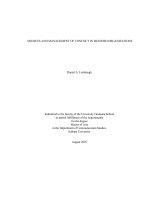- Trang chủ >>
- Luật >>
- Luật thương mại
sources and varieties of english law
Bạn đang xem bản rút gọn của tài liệu. Xem và tải ngay bản đầy đủ của tài liệu tại đây (155.36 KB, 17 trang )
UNIT 2
Legal Systems of the
World
Sources and Varieties of
English Law
Legal Systems of the World
Legal Systems of the World
Major legal systems:
1.CIVIL LAW
2. COMMON LAW
1.RELIGIOUS LAW
Legal systems of the world
CIVIL LAW (continental law)
most widespread system, based on Roman Law (French, German
Scandinavian)
-
Main source : enacted laws (codes/statutes) – passed by legislature
-
laws provide general principles and guidelines which are applied in
each case
COMMON LAW (Anglo-Saxon law)
-
developed in England in the 11th century – UK, Ireland, USA (except
Louisiana), Canada (except Quebec), Australia, India, Hong Kong
-
Sources of common law:
a) ancient customs,
b) judicial precedents (previous court rulings)
c) enacted laws
-
does not provide general principles, but court rulings
Legal systems of the
world
RELIGIOUS LAW
-
Main source: a religious system or document
-
usually follows the the principles of either civil or
common
-
Sharia in Islam; Halakha in Judaism
Afghanistan, Saudi Arabia, Oman Libya …
LEGAL SYSTEMS – often combinations of two or more
systems Israel (common, civil, Jewish), Cyprus,
Louisiana (French civil + common - federal laws;
Scotland – civil + common)
Common law vs. Civil law
The common-law legal system contrasts strongly with the civil-law legal
system of
Continental countries. Read the following pieces of information and
decide which type
of legal system they apply to.
A central importance of enacted law/central importance of precedent
B from general rules to particular cases/from individual cases to general rules
C principles are flexible/principles are based on real facts/ in time fixed principles
may not correspond to changing circumstances / principles develop in
individual cases/ general enacted principles are applied to individual cases
Common law
Continental law
A Basic characteristics of
the system
B Style of legal reasoning
C Legal principles
The United Kingdom
How do you understand the following geografical
names?
Wales
Great Britain
The British Isles
England
Scotland
Northern Ireland
United Kingdom
Ireland
The United Kingdom of Great Britain
and Northern Ireland
ENGLAND
NORTHERN IRELAND
WALES
SCOTLAND
(Great Britain)
The Republic of Ireland = a separate state
UK judicial system
UK – a unitary state made up of several separate
jurisdictions
- no single unified judicial system
UK judicial system
legal system
of England
and Wales
legal system
of Scotland
legal system
of Northern
Ireland
- substantial identity on many points
- considerable differences in law and in procedure
Sources of English law
English legal system = common law legal system
English law – no unified structure
ENGLISH
LAW
ENACTED
ANCIENT
JUDICIAL
LAW (Acts
of
CUSTOM
PRECEDEN
EQUITY
Parliament
S
TS
)
CUSTOM = unwritten law established by long use
EUROPEA
N LAW
JUDICIAL PRECEDENT = a legal decision in a previous case which is
considered as
an authoritative rule or pattern in future similar or
analogous cases
ENACTED LAW = written law made by Parliament or another legislative
body
COMMON LAW and EQUITY
-
two parallel systems of justice which exist side by side in English law
COMMON LAW
-
(as a source of law)
part of law formulated, developed and administered by the old common
law courts; based on the common customs of the country - UNWRITTEN
EQUITY
-
grew up from the practice of medieval Lord Chancellors; administered
by the Court of Chancery (Lord Chancellors were not bound by judicial
precedents of common law cvourts)
-
purpose – to add to or supplement common-law rules in cases where
these were too rigid to give justice (litigants were dissatisfied withe the
remedies of common law courts)
-
gradually became more rigid; 1873 – fused with common law; since
then administered by the same courts
-
now – an indistinguishable part of English law
Principal divisions of English
law
I according to the territory on which it is applied
1. DOMESTIC LAW
2. INTERNATIONAL LAW
II according to the parties involved
1. PRIVATE LAW – areas of law involving private
citizens
2. PUBLIC LAW – areas of law in which the state has a
direct interest
Sources and Varieties of
English
Law
Reading
comprehension
I Read quickly
the text
to decide which heading
goes with which paragraph of the text.
(1)
(2)
(3)
(4)
Common law
Branches of English law
English common law and Roman law
No unified structure of English law/ Equity and
common law
II Read the text once again in more detail and do
comprehension check exercises on pages 8 and 9.
Sources and Varieties of
English Law - Exercises
I Match the words from BOX A and BOX B below which are
most closely connected. What is the connection between
each pair of words?
BOX A
1. case law
2. justice
3. Lord
Chancellor
4. common law
5. custom
6. Parliament
BOX B
a) equity
b) legislator
c) case law
d) law reports
e) Equity
f) usage
Sources and Varieties of
English
Complete
following passage . For each blank space choose the correct word
Law
- the
Exercises
from the list below. Use each word once only.
The Importance of Legislation as a Source in English and
Continental Law
In many (1) continental countries much of the law is (2)__________ . For
this reason there is more written, or (3)_____________ than (4)
______________ law. In contrast, there is no general code of
(5)________________ law. Still,(6)___________ is common, and many
areas of law, e.g. (7)___________________ are codified, but
(8)______________ is the main source of the law.
partnership, enacted, continental, unwritten,
English, judicial precedent, legislation, codified
Match the following legal terms with
their definitions:
a court;
a lawyer;
a judicial precedent; enacted law;
legislation;
a judge;
the constitution;
parliament
=a written law made by Parliament or another legislative body
=a place where justice is administered
=the system of fundamental principles according to which a
nation, state, corporation, or the like, is governed
=making or enacting laws
=a public officer authorized to hear and decide cases in a court
of law
=a person whose profession is to represent clients in a court of
law or to advise or act for clients in other legal matters
=a legal decision in a previous case which is considered as an
authoritative rule or pattern in future similar or analogous
cases
=a legislative body in various countries
Essential terms
common law = 1. anglosaksonsko pravo (legal system) 2. englesko običajno pravo
(a source of law)
civil law = 1. kontinentalno pravo (legal system) 2. građansko pravo (branch of
law)
a custom = običaj
Roman law = rimsko pravo
the rules of equity = pravila/zakoni pravičnosti
enacted law = pisano pravo, zakonski propis (koje donosi parlament)
to enact = donijeti, propisati (od strane parlamenta)
to legislate = donijeti/donositi zakone
legislation = zakonodavstvo, donošenje zakona
legislature = zakonodavno tijelo, zakonodavna vlast
legislative = zakonodavni
judicial precedent = sudski presedan
criminal law = kazneno pravo; substantive law = materijalno pravo; family law =
obiteljsko pravo; administrative law = upravno pravo; constitutional law =
ustavno pravo; revenue law = financijsko pravo; adjectival (procedural) law =
procesno pravo









